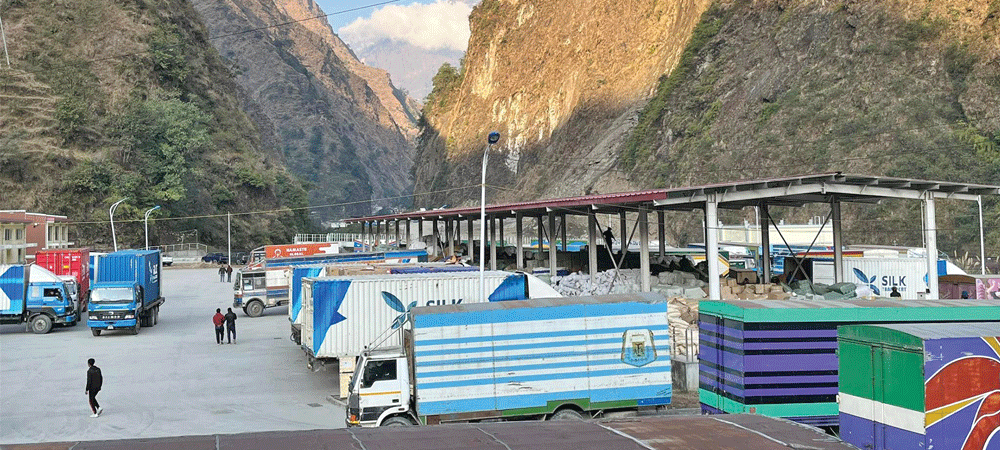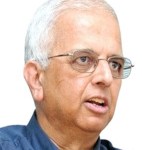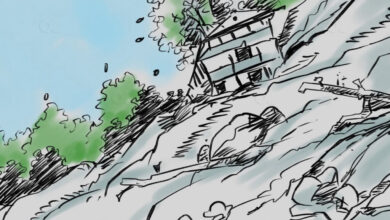Feature News: Quake-devastated Tatopani bazaar crying for reconstruction – Hemanta Joshi

Once viable with the high mobility of people, the Tatopani bazaar, a northern transit of Nepal with China, now wears a deserted look as there are dilapidated and empty commercial and office buildings, worn out hoardings and signboards, and shabby roads.
The Miteri bridge that provides access to Nepal and China is fenced off with barbed wires while the mobility of people is almost nil. Buildings of the customs office, banks, and the Chamber of Commerce and Industry are in a sorry state, as they no longer operate from there. Commercial buildings damaged by the 2015 earthquake have been left in ruins where weeds have grown on the cracked walls. Many shutters from the Miteri bridge to Liping have been vacated without entrepreneurs operating their business.
The devastating earthquake and the subsequent flooding in the first week of July, 2016 badly damaged the Liping bazaar. Many people lost their lives to the disaster. Those who survived permanently left the bazaar, while the remaining who could not afford are living there with the hope of the revival of the bazaar. Many entrepreneurs who operated their business by paying high rents have quit their occupations after they went bankrupt, while only a few of them are hardly operating their business.
Now, only a few containers laden with goods have entered Nepal from China through the bridge that was reconstructed by the Chinese side after being damaged in the quake. Most of the time, the bridge is fenced off with barbed wires. It remains open only when containers enter Nepal. Nepali people are barred from entering the Khasa bazaar at the border on the Chinese side.
The Tatopani transit that was closed due to the quake partially resumed only after three years. Again, the transit remained closed due to COVID-19. Although China agreed to allow containers into China from Nepal through the transit some three months ago, exports from Nepal have not got continuity.
The government offices including the customs office, and banks, and the Chamber of Commerce and Industry have shifted to another location, just around six kilometers away from the Miteri bridge, where a dry port has been constructed. The Khasa bazaar was also relocated a few kilometers away from the place the bazaar remained previously.
However, hopes of local people and entrepreneurs for the revival of the bazaar have not died out. They are hopeful that the bazaar will return to its previous state once China allows mobility of people across the border. The Khasa bazaar on the Indian side is the main factor that causes the mobility of people across the border. People from both Nepal and China would form crowds for business purposes.
Local Sonam Sherpa had not expected such situation of the bazaar to happen. Sherpa who was found near the Kodari bazaar full of despair vented his anger on the concerned authorities for not showing concern about reconstructing the bazaar. “Many political leaders visited here. But they did nothing. We are worn out about sharing our pains to people. All have understood our problem. But nothing positive has taken place so far,” he said.
Another local Goma Khatri accused the local government of being apathetic about repairing the bazaar. They showed up here only to do nothing. “We are without jobs. We are worried about making a living. We depend on food being supplied from outside,” she said.
Business activities here have shrunken after China halted the mobility of people through the Tatopani transit, said Hom Bahadur Basnet, President of the Sindhupalchok Chamber of Commerce and Industry. “This has affected the local people. Life here has been badly affected. There is no arable land here. There are only steep land and cliffs. They would be happy and sustain only on business,” he said.
The mobility of people would increase again when there is an easy access to the Khasa market in China, he said. “The damaged structures could be repaired and reconstructed when there is a mobility of people following the opening of the transit leading to an easy access to the Chinese market. The imports of goods have not been easy, and the consignments have not reached their destinations timely.”
Transportation cost is low when the consignment is made from China through the Tatopani transit as it lies nearer in distances than the Rasuwagadhi transit, he viewed. “It takes around 20 days for the shipment to reach Kathmandu from various cities of China. Now, it takes two-three months for the consignment to reach Kathmandu. Transportation cost can be reduced and the shipment is made timely through the transit. As a result, consumers can get goods at lower prices and local people can get jobs.”
The dry port is also struggling as it has been dealing with only a few containers daily for customs clearances. It received only three-four containers entering Nepal on a daily basis. On May 1, three containers laden with goods entered China from Nepal. Since then, the exports from Nepal have been nil, it has been said. The well-equipped dry port built with the economic and technical assistance from China was handed to Nepal in the Nepali month of Asar, 2076 BS.
The imports of goods including apple, retail materials and hydropower equipment have been sporadically made through the transit, and the exports from Nepal has come to a standstill, said Udaya Singh Bista, a customs officer at the Tatopani customs office.
In the beginning, only three-four containers carrying goods entered China from Nepal. On the other hand, only three-four containers laden with goods including apple and garlic entered Nepal on a daily basis, he said. “This year, we had aimed to collect around Rs 4.6 billion in revenues. But it seems it could meet only 50 to 60 percent of the target. Out of 72 electric vehicles imported into Nepal through the transit, some remain stuck in the port,” he said.
Diplomatic initiatives are needed to open the transit, said Minister for Health and Population Mohan Bahadur Basnet, who won a House of Representatives seat through the erstwhile elections from Sindhupalchok. For this, the Government of Nepal should convince China, he said.
“Despite efforts for long, the transit has not come into operation smoothly. The government should convince the Government of China through a diplomatic channel to open the border. Talks are advancing at the political level. But we have understood that there is an issue due to security reasons.”
The transnational trade between Nepal and China has yet to be improved. Before the 2015 quake, the trade between the two countries was amounted to over Rs 2.5 billion yearly with around Rs 1.5 billion from the Tatopani transit alone. From this trade, the government collected around Rs 6 billion in revenues. In the past, around Rs 230 million was collected in revenues from the transit on a daily basis, according to the Tatopani customs office. The number of staffs at the office has now reduced to only 14 from as high as 85 in the past.
Agreement to open other transits yet to be implemented
The only two operational transits with China—Tatopani and Rasuwagadhi—have yet to come into full operation. There is almost zero progress on other proposed transits with China. Nepal and China reached a memorandum of understanding seven years ago to carry out a feasibility study to open other alternative transits at various seven places.
The proposed transits lie at Olangchungola in Taplejung district, Kimathanka in Sankhuwasabha, Korala in Mustang, Larke in Gorkha, Lamabagar in Dolakha, Yari in Humla and Mugu. However, a feasibility study is yet to be carried out thus leading to the uncertainty about opening other alternative transits with China.




